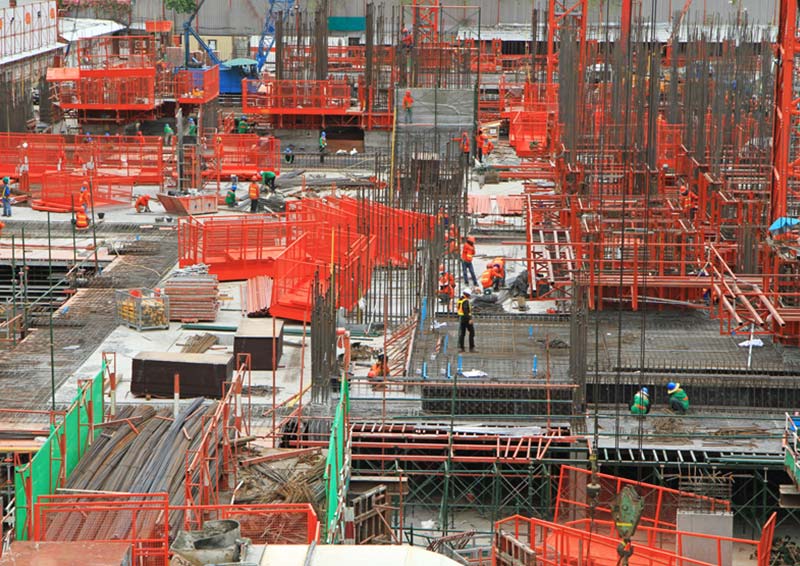Main contractor or general contractor
Contractors are organisations that carry out building, civil engineering or engineering construction work.
On small construction projects, such as domestic projects, a single contractor may be able to undertake and complete all the construction works themselves. However, on larger or more complicated projects it is unlikely that any one contractor will have all the required skills necessary to complete every aspect of the construction works, and they will generally not wish to take on direct employees for one project that may not be needed for the next. Under such circumstances therefore, contractors generally appoint others to carry out particular elements of the works.
In this situation the contractor may be described as the 'main contractor', 'general contractor' or sometimes 'prime contractor', whilst the organisations they appoint to carry out specific aspects of the works may be described as 'sub-contractors' (or subcontractors), 'subbies', or simply as 'suppliers'.
Main contractors are often appointed under a traditional contract to construct a development for which the design has already been completed by consultants appointed by the client. The works required are set out in detail in tender documents, for which the main contractor offers a fixed price, and if selected by the client, they carry out and completes the construction works. For more information, see How to find a contractor.
They may also be appointed in other ways, for example, to complete the design and then carry out the construction works, or to manage trade contractors or works contractors to undertake the construction works on behalf of the client – although these specific forms of contractors may sometimes be given different names, such as design and build contractor, management contractor, construction manager and so on. For more information, see Types of contractor.
The term ‘general contractor’ may also be used to refer to a contractor who has general buildings skills, allowing them to undertake a range of common building works, as opposed to a specialist contractor, who may only undertake certain aspects of projects, such as; piling work, lift installation, cladding installation, and so on. The term ‘prime contractor’ may sometimes be used to refer to a long-term multi-project relationship between a client and a contractor, typically where there are very large clients such as the Ministry of Defence. For more information,see Prime contractor.
The term principal contractor is a term used in the CDM regulations, referring to the contractor with overall responsibility for planning, managing and co-ordinating health and safety while construction work is being undertaken. For more information,see Principal contractor.
Civil Engineering Procedure, 7th edition, published by the Institution of Civil Engineers defines a 'general contractor' as '...a contractor who undertakes the whole of the construction of a project, but usually in turn sub-letting parts of his work to specialist or trades contractors and others as sub-contractors'. It defines 'main contractor' in the same way but with the qualification that this is distinct from a managing contractor or construction manager.
NRM2, RICS new rules of measurement, Detailed measurement for building work, defines the main contractor as, '...the contractor responsible for the total construction and completion process of the building project.'
NB: The term ‘builder’ is generally used to refer to a housebuilder, or an organisation that directly employs workers to undertake all of the roles necessary to undertake construction works, rather than subcontracting trades. Typically, this role is associated with domestic construction.
For more information, see Builder vs contractor.
[edit] Related articles on Designing Buildings Wiki
- Builder vs contractor.
- Construction manager.
- Construction contract.
- Contract strategy.
- Contractor vs supplier.
- Design and build.
- How to find a contractor.
- Management contractor.
- Operative.
- Principal contractor.
- Procurement route.
- Sub-contractor.
- Supplier.
- Specialist contractor.
- Trade contractor.
- Trades contractor.
- Types of contractor.
Featured articles and news
UKCW London to tackle sector’s most pressing issues
AI and skills development, ecology and the environment, policy and planning and more.
Managing building safety risks
Across an existing residential portfolio; a client's perspective.
ECA support for Gate Safe’s Safe School Gates Campaign.
Core construction skills explained
Preparing for a career in construction.
Retrofitting for resilience with the Leicester Resilience Hub
Community-serving facilities, enhanced as support and essential services for climate-related disruptions.
Some of the articles relating to water, here to browse. Any missing?
Recognisable Gothic characters, designed to dramatically spout water away from buildings.
A case study and a warning to would-be developers
Creating four dwellings... after half a century of doing this job, why, oh why, is it so difficult?
Reform of the fire engineering profession
Fire Engineers Advisory Panel: Authoritative Statement, reactions and next steps.
Restoration and renewal of the Palace of Westminster
A complex project of cultural significance from full decant to EMI, opportunities and a potential a way forward.
Apprenticeships and the responsibility we share
Perspectives from the CIOB President as National Apprentice Week comes to a close.
The first line of defence against rain, wind and snow.
Building Safety recap January, 2026
What we missed at the end of last year, and at the start of this...
National Apprenticeship Week 2026, 9-15 Feb
Shining a light on the positive impacts for businesses, their apprentices and the wider economy alike.
Applications and benefits of acoustic flooring
From commercial to retail.
From solid to sprung and ribbed to raised.
Strengthening industry collaboration in Hong Kong
Hong Kong Institute of Construction and The Chartered Institute of Building sign Memorandum of Understanding.
A detailed description from the experts at Cornish Lime.

























Comments
Buenos días.
Estamos realizando el estudio del Hotel Hard Rock en Marbella, y precisamos teléfono de contacto o correo electrónico
de algún responsable de producción, ya que precisamos oferta de escenario retroiluminado.
Gracias de antemano.
Samuel Mellado Carrégalo
Jefe de Producción
[email protected]
Tfno: +34 667 235 440
CONSTRUCTORA SAN JOSÉ